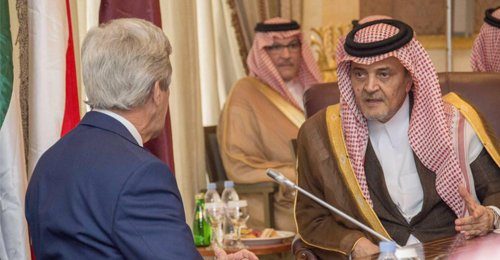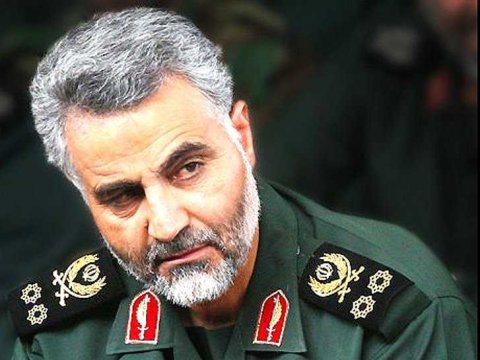
Saudi Foreign Minister Saud al-Faisal and U.S. Secretary of State John Kerry warned on Thursday of Iran’s ‘destabilizing’ policies in the region and stressed on ensuring Tehran doesn’t acquire nuclear weapons.
In a strongly worded statement, al-Faisal told reporters during a joint conference with Kerry in Riyadh:
“The situation in Tikrit is a prime example of what we are worried about. Iran is taking over Iraq” , he said.
Kerry said the United States was keeping an eye on Iran’s ‘destabilizing’ acts even as the two nations try to reach a deal on Tehran’s nuclear program.
“Even as we engage in these discussions with Iran around its nuclear program, we will not take our eye off of Iran’s other destabilizing actions in places like Syria, Lebanon, Iraq and the Arabian peninsula, Yemen particularly,” Kerry told reporters after meeting Saudi King Salman and Foreign Minister Prince Saud al-Faisal.
“Let me underscore: we are not seeking a grand bargain. Nothing will be different the day after this agreement, if we were to reach one, with respect to all of the other issues that challenge us in this region.” He added
Kerry said Iran is still considered a state-sponsor of terrorism, adding that his country was aware of Iranian military commander Qassem Soleimani’s presence and activity in Iraq.
Soleimani is reportedly overseeing Shiite militias in Iraq, Syria, Lebanon and Yemen
Al-Faisal said Kerry had given him assurances that Washington would not forget about other Iranian behavior in the region while it pursued a nuclear deal.

The Saudi top diplomat said Tikrit is an example of what is worrying the kingdom.
Saudi Arabia and several Arab countries are part of the U.S.-led air-campaign targeting ISIS in Iraq and Syria.
During his press conference with Kerry, the Saudi foreign minister called on the coalition to fight the militants on the ground.
The kingdom “stresses the need to provide the military means needed to face this challenge on the ground,” al-Faisal said, adding that the Syrian crisis is providing shelter for terrorism, “with Assad’s blessing.”
Kerry, meanwhile, said military pressure may be needed to oust the Syrian president.
“He’s lost any semblance of legitimacy, but we have no higher priority than disrupting and defeating Daesh… Ultimately a combination of diplomacy and pressure will be needed to bring about a political transition,” he told reporters, adding that “military pressure may be needed.”
Daesh is an Arabic acronym for ISIS, which has seized swathes of Syria and Iraq.
Kerry also met the foreign ministers of Kuwait, Qatar, Bahrain, the United Arab Emirates and Oman.
The US secretary of state arrived in Riyadh late on Wednesday from Montreux, Switzerland, where he said he had made progress in talks with Iranian Foreign Minister Mohammad Javad Zarif.
Gulf countries fear Iran is using its atomic program to develop a nuclear weapons capability, something Tehran denies.
Saudi Arabia regards Iran as its main regional rival and the two countries back opposing sides in wars and political struggles across the region, often along sectarian lines.
Saudi Arabia and its allies worry that a nuclear accord will not stop Iran from gaining the bomb. They are also concerned it would ease international pressure on Tehran and give it more room to intervene more in regional issues.

Leave a Reply
You must be logged in to post a comment.